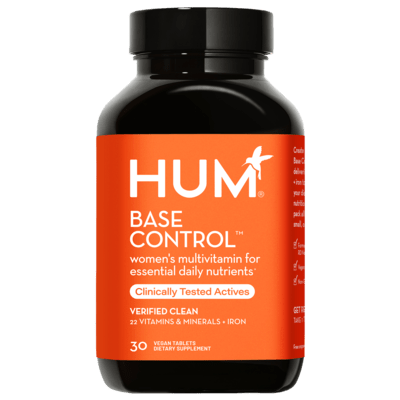Hypo, hyper, Hashimoto’s… Are we scratching our heads yet?
We’re not surprised if all this thyroid language confuses you. This small but mighty gland plays so many roles in your body that unfortunately there’s a lot that can go haywire.
Luckily, we have registered dietitian Jessica Bippen, MS, RD, to shed some light on all things thyroid. Here, she explains the difference between some of the main thyroid conditions, what causes them, and the best foods and lifestyle practices to support a healthy thyroid.





Thyroid 101
The thyroid is a butterfly-shaped glad in the front of the neck. It’s a major gland in the endocrine system. It’s even been coined the “master gland of metabolism” because it plays a significant role in energy production and metabolism. However, the thyroid gland does so much more than that. It secretes hormones that affect nearly every organ in the body. It plays a role in fat and carbohydrate metabolism, body temperature, brain development, menstrual cycles, fertility, cholesterol regulation, skin integrity, and so much more. Thyroid disorders have been on the rise. In fact, thyroid disorders affect about 15 percent of the population. It’s not surprising since nutrition and lifestyle factors have such an impact on optimal thyroid function. The thyroid is extremely dependent on nutrition to function optimally. For that reason, the food we eat is extremely important in helping preventing thyroid imbalances.
Hypothyroidism
Hypothyroidism is a condition in which the thyroid gland is underactive, which means that it doesn’t make enough thyroid hormones to function optimally. Some of the symptoms associated with hypothyroidism include fatigue, weight gain, constipation, cold hands and feet, depression, and hair loss. The most common cause of hypothyroidism is Hashimoto’s thyroiditis. It’s estimated that more than 90 percent of people with hypothyroidism have this autoimmune disease. It occurs more often in women than in men. Stress also affects thyroid levels. The thyroid works together with the adrenal glands. The adrenal glands can handle small amounts of stress well. But after periods of constant stress, the adrenals start to fatigue—hence the name “adrenal fatigue”—and cortisol levels stay raised. This strain takes a toll on your thyroid, causing it to start underproducing the necessary thyroid hormones.
Hyperthyroidism
By contrast, hyperthyroidism is a condition in which the thyroid gland is overactive. This means the thyroid is making too much of the thyroid hormones. Symptoms of an overactive thyroid include anxiety, insomnia, unintentional weight loss, feeling hot, sweating, heart palpitations, and muscle weakness, just to name a few.What Causes Thyroid Imbalances?
Not getting enough nutrients can cause the thyroid to become hypoactive. Other factors that can contribute to underactivity include chronic stress, environmental toxins such as heavy metals, and the Epstein-Barr virus or Lyme disease. Meanwhile, hyperthyroidism is most commonly associated with thyroiditis (or inflammation of the thyroid), which can sometimes happen during pregnancy but is usually short-term. Other reasons for hyperthyroid are less understood but include thyroid nodules and the autoimmune condition known as Graves’ disease. Since the thyroid is a complex system, there are many different reasons you might have an underactive or overactive thyroid. It’s extremely important not to self-diagnose. Instead, see a medical practitioner to get properly tested. Once accurately diagnosed, they can advise on how to manage your thyroid condition.
Foods To Support A Healthy Thyroid
As mentioned above, the thyroid is dependent on certain nutrients to function optimally. Specifically, it’s important to get adequate amounts of iodine, selenium, iron, zinc, and vitamin A. Here’s why each of these nutrients is critical to thyroid health.Iodine
Thyroid conditions are associated with deficiencies and excess of this nutrient. Most foods don’t contain iodine. For this reason, most commercial salt is iodized to help prevent deficiencies. Other good sources of iodine include seafood and seaweed, like kelp and dulse.Selenium
The best source of selenium is the Brazil nut. Just one nut provides you with the 137 percent of the recommended daily intake of selenium. However, the amount of selenium in plant-based foods can vary greatly depending on the soil in which they’re grown. Other good sources of selenium include halibut, tuna, sunflower seeds, and eggs.Iron
You can find iron in both plant and animal sources. Typically, animal sources of iron are easier to absorb than plant-based sources. However, one way to increase the absorption of plant-based iron is to pair iron-rich foods with vitamin C-rich foods like bell peppers, lemons, and strawberries. The top sources of iron are beef, chicken, spinach, lentils, beans, and pumpkin seeds.Zinc
Zinc is available in a variety of foods. The best sources include beef, oysters, shellfish, pumpkin seeds, hemp seeds, whole grains, and dairy.Vitamin A
Finally, vitamin A is an important fat-soluble vitamin that needs to be paired with fat in order for your body to absorb and use it. Some of the best sources are sweet potato, butternut squash, yellow bell peppers, carrots, and greens like spinach, kale, and collard greens. Again, though while many foods can improve thyroid function, it’s important to discuss nutrition with your doctor or dietitian. Some foods can interact with medications or worsen thyroid conditions if consumed in excess.Lifestyle To Support A Healthy Thyroid
Diet and lifestyle changes can make a huge impact in managing thyroid health. In addition to getting the nutrients above, reducing sugar and caffeine intake is a great idea. Reducing these can help decrease inflammation and relieve your adrenal glands so they can more efficiently manage stress. Then, making an effort to practice stress management and self-care can impact how well your thyroid functions. Start trying to include daily stress-management practices such as meditation or deep breathing. Finally, exercise isn’t only important for helping with weight management, but it can also help reduce stress and boost your mood. Find movement throughout the day by getting more steps in and setting aside time to walk or find an exercise you love.More like this









